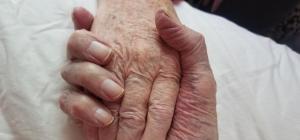Recently I was asked this question at a recent death cafe. This young professional had found himself at a loss for words at the bedside of his friend who was dying an early death due to a chronic illness. This is actually a very common conundrum for most people but especially men who have been taught that revealing their emotion and being openly vulnerable is not only not masculine or professional. This affects us all because its now often socially unacceptable to acknowledge death is inevitable to the dying.
A 2020 article on Psychology Today by Jade Wu PH.D, she states there are multiple reasons why we fear death. These reasons range from our personal physical health, age and religious devotion. I strongly recommend this article as some of the study results are not what you would expect. Our inability to relate to the dying is directly related to how we relate to death ourselves.
Religious beliefs referred to being raised from the dead in a perfect body at the return of Christ can actually embed the thought that being dead is a less than perfect state. Others believe that if you profess your belief at least once on your deathbed, no matter what your life was like, you will be accepted into the pearly gates. While others don’t even believe in the existence of the soul and that when we die we rot like a log, the end.
There is no irrefutable evidence that can prove a part of us will continue to exist after death. Yet there are near death experiences, past life experiences, paranormal evidence and a long history of metaphysical experiences which support the continued existence of self-awareness; which when viewed as a body of work, has convinced me personally. I have investigated a good number of hauntings and feel completely comfortable stating that disembodied spirits of humans (and entities) are absolutely real and interact with us often.
I have had multiple experiences of being with people as they pass. The practice of working with the dying, like most exposure therapy eases the fear of the unknown realm of the Dead. This too changes a person’s perspective. The only way to help others with death is to choose to wrestle with that shadow yourself. As I’ve stated probably in EVERY article, tomorrow is not promised; therefore, by not preparing yourself for these situations you may loose a valuable opportunity.
Trigger warning: I think one of the biggest fears, is not that of death directly, but that by acknowledging death can be imminent, it may cause a person to lose the will to live. This can be internalized by grieving individuals as having accidentally caused someone’s death and actually they are beating themselves up as having inspired a suicide. Suicide is a whole Pandora’s box which I previously wrote an article on The Right to Die and Death With Dignity (physician assisted suicide) movement.
Allow me to state that a person who is having serious health issues is not the same as a person who is actively dying, particularly in elderly patients. The phrase “active dying” refers to the fact that the doctors have done all they can and death is imminent in hours to weeks.
This is not the same as a Hospice level diagnosis. Technically one can qualify for Hospice if the doctor’s diagnoses is that death is likely to occur within 6 months. However, I often see in my local area, that by the time someone is given that diagnosis, they are actually only weeks away from death. This can be particularly confusing for me personally because I know they dont want to offer hospice services for people who may go on living for years. Part A of Medicare pays for hospice care at first for six months. After that six months an unlimited number of 60-day periods becomes available, if you are still considered terminally ill. In other words, hospice care is available in increments of 60 days for an indefinite period of time.

Let us consider several possible scenarios and options of action:
What if the dying are at home and on hospice? These are really wonderful situations that are the most comfortable. Often the patient has some clarity and is aware. Depending on medication levels, there is a good chance you can have a nearly normal ability to converse, even with the elephant in the room.
What can you do?
- First and foremost, treat your friend as you always have. Joke with them and chat about your usual things, just be comfortable. Nothing is worse than making the situation about you and your inability to deal with the situation. Focus on your friend/loved one.
- Let’s address the elephant in the room! Gauge the awareness of your friend by inquiring what they know about their diagnosis and what the expected outcome may be.
- Ask how they feel about that diagnosis and the likely outcome.
- Ask if they feel prepared to face that and how you could help them feel more at peace with it.
- This is often where people will be flippant and dismissive. This is where they are trying to be polite and allow you (and themselves) an out rather than go where things can be intensely emotional. All you need to do is to communicate that you are there to support them and that you can LISTEN. No one is expecting you to fix it or have answers.
- Address the situation as if they are going on a trip; it is actually the ultimate trip. This can even involve into an easy way to communicate and give structure to the unknown aspects of leaving.
- Details are important. Talk about your favorite memories with them. Skinny dipping, coffee in the morning, that trip to Vegas. Go for laughter!
- It doesn’t have to profound. Be sure to tell them how important they are to you and what you garnered from having them in your life. Even if its that they made the best pancakes in the world, that is important!
- Words can fail, but your actions will express all that needs to be said. Don’t be afraid to show your tears… this is pain leaving the body. The harder you push emotional pain away the more painful it feels and the harder and longer your grief will be. It’s ok to break down, sob and hug them. YOU both will get more out of that than you can imagine! BE VULNERABLE. Can you imagine how valuable you are making that person feel. And it allows them the opportunity to comfort you! WHAT A GIFT!
Perhaps you’ve come to visit with a person is in and out of consciousness or clarity. People in a facility/hospital setting are often on a great deal of pain medication or dementia and it can be a struggle to have a conversation or they may completely unable to communicate.
What you can do:
- Hold their hand and touch them gently. Remember that scents, and touches may be intensified so be gentle, but please do it. Loving, gentle touch is often missing from the end-of-life because its all medically centered. You can also brush their hair, wash their face, arms, hands or feet. Apply lotion and lip balm. (I’ve never understood why cosmetic cleanliness seems to take a backseat to medical care when dying. If I’m dying, please brush my hair, wash my face, and (Scout) please do a bit of light makeup! I need to feel presentable to receive guests and address such a momentous occasion.)
- Don’t be afraid to lie next to them or cradle them in your arms.
- Talk out loud to them, they can hear you. Hearing is the last sense that is lost. Your voice may be like part of a dream in their experience, so be aware of what you are putting into their mind.
- Be honest with them. If you are their heath care agent/proxy, their closest living relative, or the acting death doula, please tell them they are dying. Tell them the diagnosis and what is happening to them.
- Tell them where they are and who is in the room. Tell the who the aid/nurse is and what procedure they are doing. People are not packages and nursing staff can get caught up in doing an job. Even doctors no longer speak to those who are unconscious. They are still alive and likely aware!
- Don’t talk about the will, the funeral or the burial! This is business and in reality, it only affects the living… not the dying! Be aware and considerate of what is important to the dying.
- Everything listed above still applies.
- Consider talking about their closest loved ones who have already died. I am a firm believer that the dead come to greet/gather up the dying. Sometimes they will tell you who is coming to gather them. Ask the nurses if they have noticed her talking about anyone that might be passed; this will not be a strange question to them, trust me. Its likely whomever they loved the most during their life, often its a parent, spouse, sibling or best friend. You can help them reconnect with them by assuring them that “Uncle John is here to be with you.”
Take time to think about these things before you go into their room. You can have a set of favorite memories ready as well as a possible discussion about who has already passed that will be there to greet them. Don’t be afraid to look like a fool, to be emotional or to be out of control. Death is the ultimate revealer of what is actually important.
We will address what to say at the bedside death of an abuser or trauma partner in the next article.

















